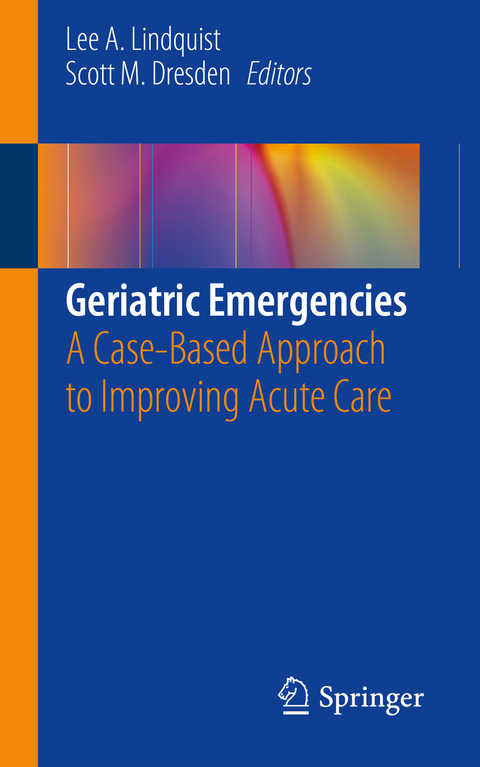
Geriatric Emergencies
Springer International Publishing (Verlag)
978-3-030-12413-7 (ISBN)
It is unknown how many older adults are hospitalized for reasons other than acute medical illness, such as functional decline, polypharmacy, progressive dementia, caregiver stress, or unstable living situation. These non-emergent conditions are rarely addressed during a typical ED visit due to lack of resources, significant patient volumes, and the need for rapid turnover of care spaces. The predominant management strategy of emergency physicians to handle these important but not imminently life-threatening geriatric issues is to recommend hospital admission.
Northwestern has pioneered the Geriatric Emergency Department through the creation of the Geriatric Emergency Department Innovation model (GEDI), with goals to prevent admissions for older adults by assessing and meeting their geriatric-specific, non-acute care needs in the ED. The GEDI model at Northwestern centers on a multi-disciplinary curriculum composed of clinical, didactic, and practical arms developed by emergency medicine and geriatrics educational experts.
In this title, we will present case studies of older adults seen in the Emergency Department through the GEDI model and discuss means of identifying/screening for, diagnosing, and treating geriatric syndromes seen in the emergent care of the older adult patient. In addition, there will be a set of concise "take-home points" for each case study that will be easy to commit to memory and implement in clinical care of older adults.
As the number of seniors seeking emergent care will continue to increase, the ED setting must become responsive to geriatric-specific needs. This book will provide a variety of models detailing how to offer comprehensive, state-of-the-art, optimal care for managing the full range of geriatric syndromes that regularly present in the emergent care setting.
Lee A. Lindquist, MD MPH MBA Associate Professor of Medicine Section Chief of Geriatrics Northwestern University Feinberg School of Medicine 750 N. Lake Shore Drive, 10th Floor Chicago, IL 60611 Scott Dresden, MD Assistant Professor of Medicine Department of Emergency Medicine Northwestern University Feinberg School of Medicine 211 E. Ontario, Room 200 Chicago, IL 60611
Growing Older in the Emergency Department.- Components of an effective Geriatric Emergency Department.- Cognitive Impairment in the ED.- Syncope in a rural emergency department setting.- ER referrals and hospitalizations from Post-Acute and Long-Term Care Facilities.- Can Home Visits Make a Difference to Emergency Department Visits? "I will just stop by his place on the way home: Who knew it would be a journey?".- Medication Errors in Aging Adults: A Case-Based Approach to Medication Management.- Pain, Opioid Use, and Palliative Care of Older Adults in the Emergency Department.- Acute Mental Status Changes and Over-the-Counter Medications in Older Adults.- Identifying fall risk in the Emergency Department.- Capacity, Advanced Planning, and Buying Time
"This book is meant for medical providers of all levels, including students, nurses, and seasoned professionals, and for older individuals seeking medical care or their families. ... This book provides brief discussions of selected topics commonly complicating geriatric medical emergencies and offers discrete, bulleted suggestions. It may be useful for older patients and/or their families but is written mostly for medical providers." (Benjamin A Willenbring, Doody's Book Reviews, August 23, 2019)
“This book is meant for medical providers of all levels, including students, nurses, and seasoned professionals, and for older individuals seeking medical care or their families. … This book provides brief discussions of selected topics commonly complicating geriatric medical emergencies and offers discrete, bulleted suggestions. It may be useful for older patients and/or their families but is written mostly for medical providers.” (Benjamin A Willenbring, Doody's Book Reviews, August 23, 2019)
| Erscheinungsdatum | 29.05.2019 |
|---|---|
| Zusatzinfo | X, 214 p. 15 illus., 6 illus. in color. |
| Verlagsort | Cham |
| Sprache | englisch |
| Maße | 127 x 203 mm |
| Gewicht | 247 g |
| Themenwelt | Medizin / Pharmazie ► Medizinische Fachgebiete ► Geriatrie |
| Schlagworte | Complex geriatric cases • ER sustainability • Initial screening • pharmacotherapy • transitioning care |
| ISBN-10 | 3-030-12413-4 / 3030124134 |
| ISBN-13 | 978-3-030-12413-7 / 9783030124137 |
| Zustand | Neuware |
| Informationen gemäß Produktsicherheitsverordnung (GPSR) | |
| Haben Sie eine Frage zum Produkt? |
aus dem Bereich


